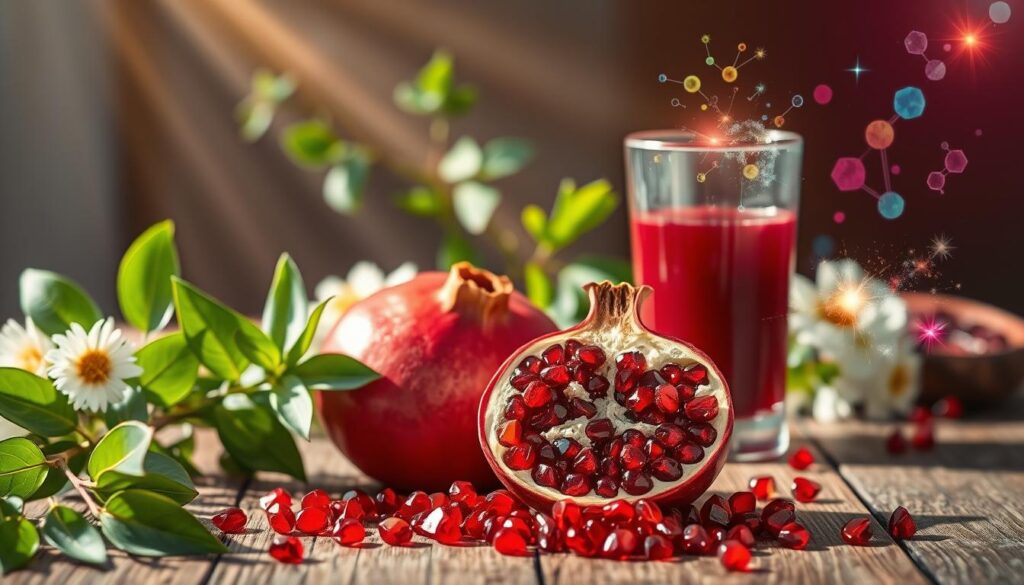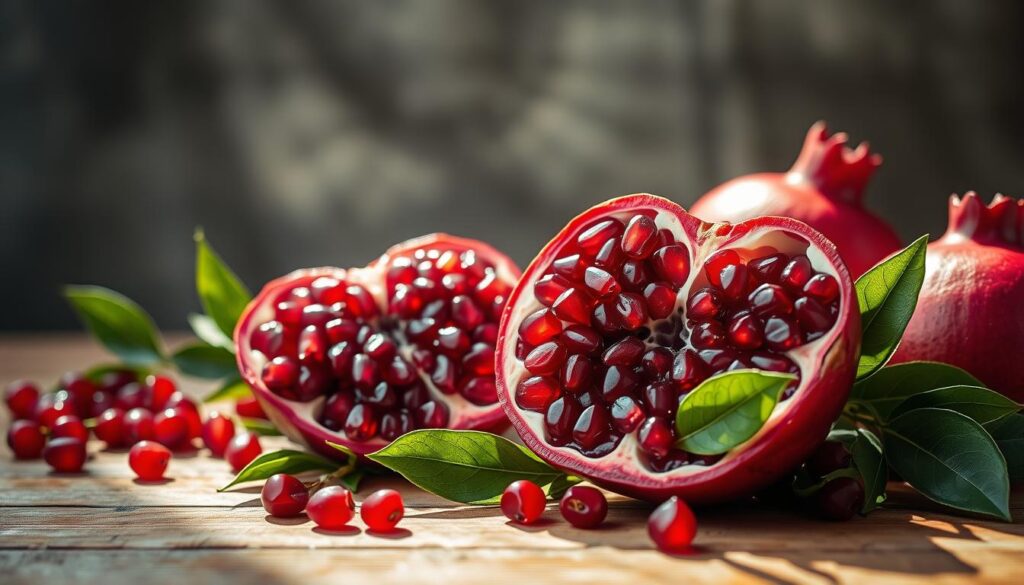Did you know drinking a glass of pomegranate juice daily might cut your heart disease risk by up to 30%? This amazing fact shows the growing research backing pomegranate’s heart health benefits. We’ll dive into the science behind pomegranate’s heart-protective effects. We’ll look at the key antioxidants, clinical studies, and how it works to keep your heart healthy.
Key Takeaways
- Pomegranate juice is packed with antioxidants that protect the heart and blood vessels.
- Many studies have shown pomegranate juice can lower blood pressure, improve cholesterol, and reduce heart disease risk.
- The anti-inflammatory effects of pomegranate juice also help your heart.
- Adding pomegranate juice to a healthy lifestyle can boost heart health.
- Choosing the right amount, timing, and quality is key to getting the most from pomegranate juice.
Understanding the Power of Pomegranate Juice for Cardiovascular Health
Pomegranate juice has been valued for thousands of years in traditional medicine. It’s known for its antioxidants and support for heart health. Modern science is backing up the ancient wisdom, showing its benefits.
Historical Use in Traditional Medicine
For ages, pomegranate juice was key in traditional medicine worldwide. It was prized in Ayurvedic and Persian traditions for heart health and preventing cardiovascular disease. It was thought to purify blood, boost circulation, and fight off many illnesses.
Modern Scientific Validation
Today, science has tested the claims about pomegranate juice. Studies have found it’s packed with antioxidants like ellagic acid and punicalagins. These help fight oxidative stress and inflammation, big factors in cardiovascular disease.
Research also shows it can lower blood pressure and improve cholesterol. This supports heart health. The scientific community is still learning about its benefits, backing up its traditional uses.
“Pomegranate juice is a treasure trove of antioxidants, with the potential to revolutionize our approach to cardiovascular health.”
Key Antioxidants Found in Pomegranate Juice
Pomegranate juice is a top source of antioxidants. It’s full of polyphenols, which are powerful compounds. These include punicalagins and ellagitannins, making pomegranate juice a treasure for our health.
Punicalagins are the most common polyphenols in pomegranate juice. They are known for fighting free radicals and reducing oxidative stress. This helps protect our heart and keeps it healthy.
Pomegranate juice also has ellagitannins, another type of polyphenol. These are good for our health, helping to keep inflammation low and cholesterol balanced.
| Antioxidant | Key Benefits |
|---|---|
| Punicalagins | Neutralise free radicals, support cardiovascular health |
| Ellagitannins | Maintain healthy inflammation levels, support cholesterol balance |
Pomegranate juice is a standout among fruit juices. It has more polyphenols than blueberry, cranberry, or green tea. This makes it a great choice for boosting your antioxidant intake and heart health.

Pomegranate’s Juice for Heart: Scientific Evidence and Studies
Research shows pomegranate juice is great for heart health. It’s full of antioxidants that help the heart. Studies have looked at how it affects the heart in different ways.
Clinical Trials Overview
Many clinical trials have tested pomegranate juice’s heart benefits. They used people with different heart risks. These studies have shown pomegranate juice is good for the heart.
Research Findings on Heart Health
- Studies show pomegranate juice lowers blood pressure. This is key in preventing heart disease.
- It also improves blood vessel function. This is important for blood flow and heart health.
- Plus, it reduces artery plaque. This lowers the risk of heart attacks and strokes.
Latest Scientific Developments
Scientists keep finding more about pomegranate juice’s heart benefits. They’re looking at how it affects heart health biomarkers. This research makes pomegranate juice even more valuable for heart health.

“Pomegranate juice has emerged as a promising natural intervention for cardiovascular health, with a growing body of evidence supporting its therapeutic potential.”
How Pomegranate Juice Affects Blood Pressure Levels
Research shows that pomegranate juice might help control blood pressure. This is key for heart health. The juice’s antioxidants and anti-inflammatory effects could help manage hypertension and lower cardiovascular disease risk.
Pomegranate juice may help blood pressure by improving blood vessel function. The endothelium, a thin layer inside blood vessels, is crucial for blood pressure. The juice boosts nitric oxide, helping blood vessels open up and blood flow better.
| Study | Findings |
|---|---|
| A randomized, double-blind, placebo-controlled study | Those drinking pomegranate juice daily for four weeks saw lower blood pressure than the placebo group. |
| A meta-analysis of clinical trials | The study found pomegranate juice lowers blood pressure, especially in people with high blood pressure. |
Adding pomegranate juice to your diet might help keep blood pressure healthy. It could also lower cardiovascular disease risk. Always talk to a doctor before changing your diet or adding new supplements.
Impact on Cholesterol Management and Heart Disease Prevention
Research shows pomegranate juice could help manage cholesterol and prevent heart disease. It can improve both LDL and HDL cholesterol levels. This is good for your heart health.
LDL Cholesterol Reduction
Studies have found pomegranate juice lowers LDL, or “bad” cholesterol. Drinking it can lower LDL cholesterol levels by 9-17% in a few weeks. This is great because high LDL levels can lead to heart disease.
HDL Cholesterol Enhancement
Pomegranate juice also boosts HDL, or “good” cholesterol. This improves your overall cholesterol balance, which is key for a healthy heart. Boosting HDL cholesterol adds to the juice’s heart-protective benefits.
“Pomegranate juice has been shown to improve cholesterol levels and reduce the risk of heart disease by simultaneously lowering LDL and raising HDL cholesterol.”
Pomegranate juice tackles both LDL and HDL cholesterol, making it a natural way to prevent heart disease. Its effects on cholesterol make it a popular choice for heart health.

| Cholesterol Parameter | Effect of Pomegranate Juice |
|---|---|
| LDL (Bad) Cholesterol | Reduction by 9-17% |
| HDL (Good) Cholesterol | Increase |
Anti-inflammatory Properties and Cardiovascular Benefits
Pomegranate juice is known for its anti-inflammatory effects. It’s seen as a natural way to keep the heart healthy. Chronic inflammation can lead to heart disease, and pomegranate juice’s antioxidants may help fight this.
Research has shown that pomegranate juice’s anti-inflammatory compounds can stop the production of harmful molecules. This can reduce oxidative stress and improve blood vessel function. Both are important for preventing heart disease.
Studies have found that drinking pomegranate juice regularly can lower blood pressure and improve cholesterol levels. It can also slow the buildup of plaque in arteries. These benefits suggest that pomegranate juice is good for the heart.
“Pomegranate juice has the potential to be a valuable addition to a heart-healthy diet, thanks to its ability to reduce inflammation and support overall cardiovascular function.”
More research is needed to fully understand how pomegranate juice affects heart health. But, the anti-inflammatory properties of pomegranate and its pomegranate juice and cardiovascular disease benefits are clear. Adding this juice to a healthy diet could be a simple way to support heart health over time.

Recommended Daily Intake and Best Consumption Practices
To get the most from pomegranate juice for heart health, knowing how much to drink and when is key. Experts say adding pomegranate juice to your daily routine can boost your heart health.
Optimal Serving Size
The best amount of pure, unsweetened pomegranate juice is 4-8 ounces (120-240 ml) a day. This amount gives you a good dose of antioxidants and polyphenols from pomegranates. It also keeps sugar intake low.
Timing and Frequency
- Drinking pomegranate juice in the morning is best. It starts your day with heart-healthy nutrients.
- For the best results, drink it every day or a few times a week. Don’t drink it just sometimes.
Quality Selection Tips
Choosing the right pomegranate juice is important. Look for 100% pure juice without added sugars or preservatives. Opt for organic, cold-pressed juices. They keep more nutrients and avoid blends or concentrates that weaken the juice’s power.
| Recommended Daily Intake | Optimal Serving Size | Timing and Frequency | Quality Selection Tips |
|---|---|---|---|
| 4-8 ounces (120-240 ml) per day | Morning consumption for best results | Daily or several times per week | 100% pure, organic, and cold-pressed |
By sticking to these guidelines, you can enjoy the heart health perks of pomegranate juice. Add this superfood to your daily life with confidence.
Potential Side Effects and Precautions
Pomegranate juice is usually safe for most people. But, there are some side effects and precautions to know. This is especially true for those with certain health issues or on specific medications.
Pomegranate juice can affect blood pressure levels. It has been shown to help lower pomegranate juice blood pressure. However, if you’re already on blood pressure medication, it’s important to watch your blood pressure closely. Drinking pomegranate juice might make your blood pressure drop too low.
It also might interact with cholesterol-lowering drugs, like statins. Research suggests that pomegranate juice and cholesterol levels are connected. Pomegranate juice could make these drugs work better. Before adding pomegranate juice to your diet, talk to your doctor if you’re on heart or blood pressure medications.
People with kidney disease or digestive problems should be careful with pomegranate juice. Its high potassium can be a problem for those with kidney issues. The juice’s acidity might also make stomach problems worse.
Always talk to a healthcare professional before using pomegranate juice, especially if you have health issues or take medications. Knowing the potential side effects and precautions helps you enjoy its heart health benefits safely.
Conclusion
This article shows how pomegranate juice can help your heart. It’s full of antioxidants and can lower blood pressure and cholesterol. It also has anti-inflammatory effects, making it a great natural choice for heart health.
While pomegranate juice is promising, don’t forget the basics of heart health. Eating well and staying active are key. Adding pomegranate juice to your routine can help keep your heart strong.
If you’re thinking about trying pomegranate juice, talk to your doctor first. They can help make sure it’s safe for you. By doing this, you can use pomegranate juice to keep your heart healthy for years to come.





